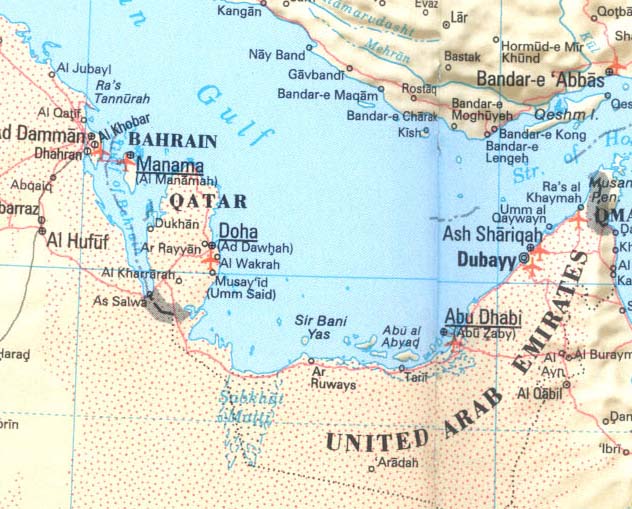
Following my recent discussion of climate change, I was interested to read the very recent news about dead fish floating off the coasts of Qatar. With water temperatures reacing 39 degrees celsius (over 102 degrees farenheit), fish and other species are dying. As the article relates, not only are rare sea turtles in danger but the coral reefs as well and 20 species of fish have disappeared.
Troubled waters: Dead fish floating at sea
Web posted at: 8/8/2008 3:15:20
Source ::: The Peninsula / By Satish Kanady
Doha • A large number of dead fish have been seen floating in the sea off Qatar. A group of fishermen who returned after their catch to Shamaal on Monday said they saw a vast quantity of dead fish floating about 45km off the coast. The high temperature of sea water is believed to have caused the mass death of fish.
"This is a common occurrence in the deep seas during peak summer. The death of fish is due to the extreme temperature of sea water", a boat operator told The Peninsula. Cheri and the popular Hamour, among other species, were seen among the dead fishes, he said.
The sea water off Qatar's coast yesterday registered a temperature of 39 degrees Celsius, the highest in recent years.
Qatar's coastal areas were littered with dead fish and invertebrates during the summer of 2006 after the sea water reached a temperature of 37 degrees Celsius. Large quantities of fish and endangered sea turtles were washed up on the shores at Al Khor, Mesaieed, Al Messeilah, Um Alhoul, Al Wakra, Ras Abu Fontas, Doha, Al Marunah and Al Jassayiah for five days.
The Meteorological office yesterday said the sea water off Qatar has been recording a high temperature of 38-39 degrees Celsius for the past few days.
Experts say high temperature of sea water is a potential cause for the death of fish. This may happen during peak summer, when the water temperature exceeds the tolerance range of fish.
Water temperature may affect fish and invertebrates in two ways. The metabolic activity of fish (oxygen consumption) increases with the temperature of the water. But at the same time, increasing temperatures reduce the amount of soluble oxygen in the water, they say.
Qatar's coastal marine belt is already under severe pressure. Studies have shown that the salinity and temperature of the sea water here are the highest in the Middle East. While the average salinity in the Middle East is 40 ppm (parts per million), the figure is 55 ppm in Qatar, as against the global average of 35 ppm.
Recent studies have also shown that more than 20 species of fish have disappeared from Qatar's territorial waters. That rising temperature of the sea water is also posing a serious threat to the country's unique coral deposits. Qatar's coastal marine areas are home to many ecologically sensitive species, including sea turtles. Of the eight species of sea turtles found across the world, four are found in the sea off Qatar.
Web posted at: 8/8/2008 3:15:20
Source ::: The Peninsula / By Satish Kanady
Doha • A large number of dead fish have been seen floating in the sea off Qatar. A group of fishermen who returned after their catch to Shamaal on Monday said they saw a vast quantity of dead fish floating about 45km off the coast. The high temperature of sea water is believed to have caused the mass death of fish.
"This is a common occurrence in the deep seas during peak summer. The death of fish is due to the extreme temperature of sea water", a boat operator told The Peninsula. Cheri and the popular Hamour, among other species, were seen among the dead fishes, he said.
The sea water off Qatar's coast yesterday registered a temperature of 39 degrees Celsius, the highest in recent years.
Qatar's coastal areas were littered with dead fish and invertebrates during the summer of 2006 after the sea water reached a temperature of 37 degrees Celsius. Large quantities of fish and endangered sea turtles were washed up on the shores at Al Khor, Mesaieed, Al Messeilah, Um Alhoul, Al Wakra, Ras Abu Fontas, Doha, Al Marunah and Al Jassayiah for five days.
The Meteorological office yesterday said the sea water off Qatar has been recording a high temperature of 38-39 degrees Celsius for the past few days.
Experts say high temperature of sea water is a potential cause for the death of fish. This may happen during peak summer, when the water temperature exceeds the tolerance range of fish.
Water temperature may affect fish and invertebrates in two ways. The metabolic activity of fish (oxygen consumption) increases with the temperature of the water. But at the same time, increasing temperatures reduce the amount of soluble oxygen in the water, they say.
Qatar's coastal marine belt is already under severe pressure. Studies have shown that the salinity and temperature of the sea water here are the highest in the Middle East. While the average salinity in the Middle East is 40 ppm (parts per million), the figure is 55 ppm in Qatar, as against the global average of 35 ppm.
Recent studies have also shown that more than 20 species of fish have disappeared from Qatar's territorial waters. That rising temperature of the sea water is also posing a serious threat to the country's unique coral deposits. Qatar's coastal marine areas are home to many ecologically sensitive species, including sea turtles. Of the eight species of sea turtles found across the world, four are found in the sea off Qatar.



